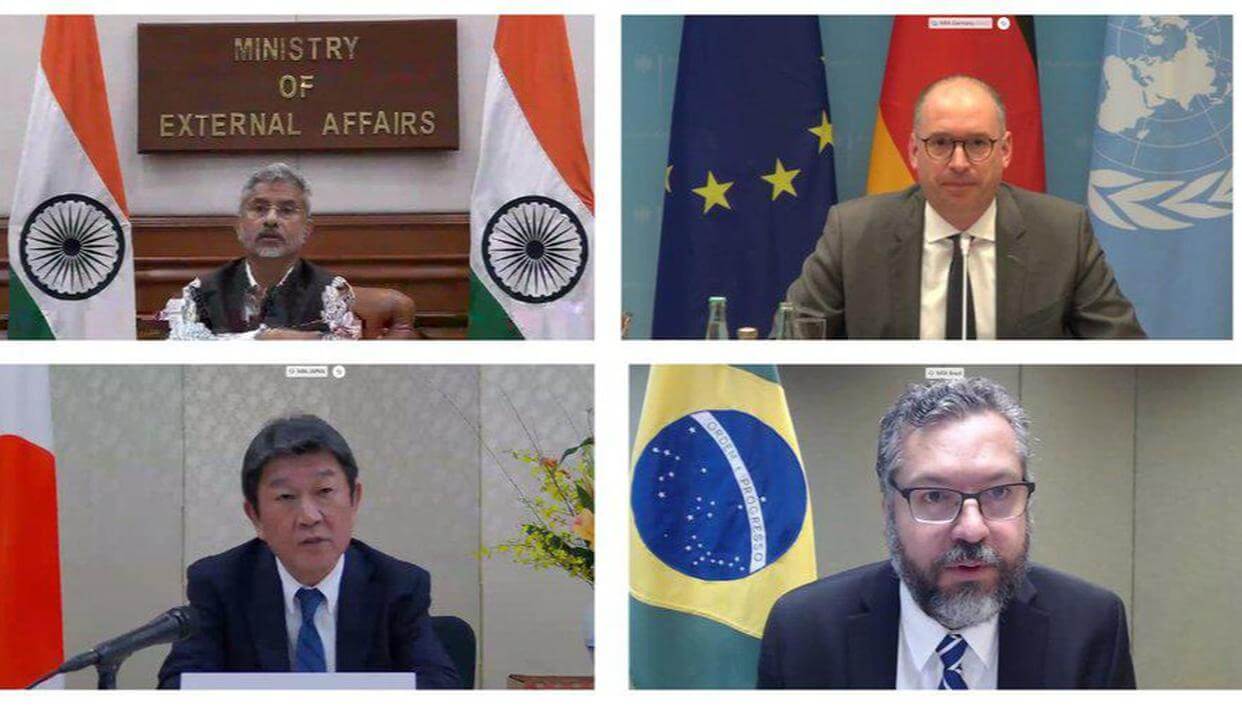Foreign ministers of G-4 nations (Brazil, India, Japan, and Germany) met on the sidelines of the 75th United Nations (UN) General Assembly on Wednesday and called for a “decisive push” for much needed and long-delayed reforms of the UN Security Council.
Arguing that steps to improve and update the UN and its decision-making bodies were necessary to “better reflect contemporary realities”, the foreign ministers—Brazil’s Ernesto Araújo, India’s S. Jaishankar, Japan’s Motegi Toshimitsu, and Germany’s minister of state in the federal foreign office, Niels Annen, who represented foreign minister Heiko Maas—in a joint statement expressed their “disappointment” at attempts to stall and derail this process, and committed to addressing the issue in a meaningful way.
The move is in line with India’s position on UN reforms. New Delhi has been at the forefront of pushing for an expansion of the UNSC, asserting that “unreformed and under representative” international institutions were less likely to effectively address global challenges. The ministers on Wednesday stressed on this issue, and said that reform focused on fostering “increased and enhanced representation of countries with the capacity and willingness to contribute to the maintenance of international peace and security, including from Africa, will allow it [the UN] to preserve its credibility and create the political backing needed for the peaceful resolution of today’s international crises.” The leaders warned that this was the only way to keep the international body from becoming obsolete.
India and the other G-4 nations have been pushing the UN to expedite the UNSC reform process by calling on other like-minded countries to work towards finding alternatives to the informal Intergovernmental Negotiations (IGN) framework, which has made no progress in the last decade. In September, India’s Deputy Permanent Representative Nagaraj Naidu, on behalf of the G-4, wrote to UNGA President Tijjani Muhammad-Bande, saying that “after more than a decade towards text-based negotiations, the intergovernmental negotiations process has become a convenient smokescreen to hide behind for those who do not wish to see any reforms in the Security Council”.
At the Wednesday meeting, the ministers also said that the IGN was constrained by “flawed working methods”, and that the negotiations lacked the openness and transparency required to move forward. They added that they were “convinced that time has come to leave behind debates based solely on general statements, without substantive text-based negotiations actually taking place in an intergovernmental setting” and urged for the immediate resumption of the IGN “as a direct continuation of the previous session” that was adjourned due to COVID-19 in March. The group said that it would “continue to engage with other reform-minded countries and groups and pursue the start of text-based negotiations without delay” and that it will seek “concrete outcomes” on this front during the current session of the UNGA, which will last until next September.
The countries also reiterated that they mutually supported each others’ bid for permanent membership to the UNSC, stressing the importance of properly representing the African continent in both, the permanent and non-permanent categories of membership of a reformed and expanded UNSC “to correct the historical injustice against this continent with regard to its under-representation in the Security Council”.
G-4 leaders call for UN Security Council Reform
The officials argued that steps to improve and update the UN and its decision-making bodies were necessary to “better reflect contemporary realities”.
September 24, 2020

Clockwise: India’s S. Jaishankar, Germany’s minister of state in the federal foreign office Niels Annen, Brazil’s Ernesto Araújo, and Japan’s Motegi Toshimitsu. SOURCE: REPUBLIC WORLD
